There is Chinese song titled “Green leaves missing for the root” – historical figures are always the subject of endless debates and reevaluation, but no matter what quibbles historians may find, it’s these same figures who are promoting the advancement of history.
One such figure is Henry Alfred Kissinger, an American diplomat who played an almost unparalleled role on the international political stage in the 20th century. China and the US established diplomatic ties with each other on Jan. 1st, 1979, during Kissinger's famous “ice-breaking tour”. Kissinger's brilliance and influence is such that many still believe he came to China as Sectary of State, in fact, he was only the National Security Advisor – a traditionally much less diplomatically influential position - at that time.
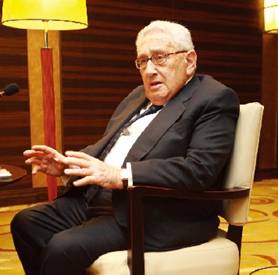
In China, Kissinger’s name is well known – students first learn about him in their middle school classes. The eight years between the “ice-breaking tour” and establishment of official diplomatic ties were a dizzying period in China’s history. During those years China ended the Cultural Revolution and began reform and opening-up, thereby radically transforming Chinese society and paving the way for it’s emergence today as one of the world’s major powers. It has been 30 years since the establishment of Sino-American diplomatic ties, a dynamic time in world and Chinese history. China has transformed itself from a country closed off from the world to a superpower casting a sphere of influence over the entire globe. In this interview with Beijing Youth Weekly former Secretary of State Kissinger shares his thoughts on this historic anniversary and the future of Sino-US relations.
Beijing Youth Weekly (BQ): First of all, I want to express my gratitude for your contribution to the Sino-US relationship for the past 30 years. If President Obama asks for opinions on US-China policy what will your suggestions be?
Kissinger: My article published in the International Herald Leader said that Sino-US relations need to be raised to a higher level. Many of today’s major issues are global ones - such as energy, environment, and nuclear proliferation, and can only be solved through close cooperation between China and America. If President Obama asks for my suggestions that’s what I will tell him.
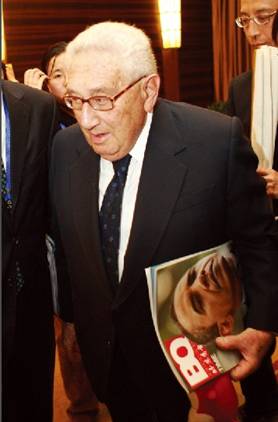
BQ: The New York Security Exchange (NYSE) held a ceremony to commemorate the 30th anniversary of the establishment of diplomatic ties between China and the US on Jan. 12th, 2009. In what ways do you think the Sino-US relationship will develop, especially the relationship in the economic field? Some say that in the 21st century, the Sino-US economic relationship will be more competitive, and yet you have said it is a complex and interdependent relationship. How do you regard the Sino-US relationship, especially the Sino-US economic relationship against the backdrop of the financial crisis?
K: It was 1971 when I visited China for the first time. It was before the reform and opening. At that time we were using securities to develop a symbolic relationship. I never thought one day I would celebrate the 30th anniversary of establishment of the diplomatic ties between China and the US. It is a wonderful experience. We are walking into a brand-new historical era. In the past, people only thought about competitiveness when discussing relations between countries. Today, we are economically competitive and, simultaneously, cooperative. We have certain obligations to our people and world order, and we have achieved certain agreements on some key issues such as energy supply and demand, but things are not always the same every year. It’s crucial for China and the US to achieve agreement on some principle issues on the production and consumption of energy.
BQ: You mentioned in your speech that the Sino-US relationship will reshape the global economy. In your opinion, compared with the 20th century, what will be the differences in economic patterns in the 21st century?
K: When I first visited China, in 1971, China and the US were two competitive countries. Now the Sino-US relationship has reached a new stage. It is not only between the two countries, but also involves the international situation. To some degree we are economically competitive, but now we have achieved understanding and agreement on many issues as well, such as the energy issue. What’s important is that China and the US should reach agreement on certain key principles.
We can note, that during a global economic crisis no international political institution can solve it independently. Now, we are in the process of a global economic crisis; no country can remain unaffected. I agree with Chinese leaders that the world economic crisis needs to be discussed at some large international summits. Some believe it should be discussed in the manner of the G20 financial summit held in the US the 2008, while some believe it can be addressed in smaller-scale conferences.
I cannot offer any formula or method for solving the economic crisis, but the economic crisis makes us more aware of the economic interdependency of China and the United States. China helped us alleviate the crisis through a series of actions, such as buying US bonds. I also hope China can seize the opportunity to make wise investment decisions. From this vantage point, we can anticipate the Sino-US relationship will develop in a more active direction in the future.
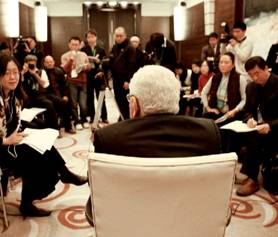
BQ: How will the Taiwan issue develop after Obama comes into power?
K: When I was working with China we were not yet at the stage of discussing this situation. Taiwan is a tough issue. Nixon and I favored a model we proposed, the idea of “One China”. Now the US reiterates we support the principle of “One China” and oppose any attempt to create “two Chinas”, or, “one China, one Taiwan”. The Chinese government has indicated it will try to adopt peaceful methods, so the negotiation process can be continued. I hope we can continue to achieve development. We have come a long way; I believe it will not be an obstacle much longer. I don’t think the Taiwan issue is a fundamental one.
BQ: How did the US public regard the Sino-US relationship 30 years ago? What are the changes now?
K: When I came to China for the first time 38 years ago, the reason why I visited China secretly was that we were afraid of overwhelming opposition if we announced it beforehand. In that environment we could not have been able to succeed at what we hoped to. Most of the US public supports China, but they don’t understand China’s economic system, which is different from that of the US. Since then, although there have been difficulties, more and more people believe the Sino-US relationship is very important. There are also conservatives who criticize the Sino-US relationship when problems emerge. This is a characteristic of the US; we should be accustomed to it. I cannot represent Obama because I only had a 5-minute discussion with him, but I know almost all the officials in his government, so I am very optimistic about the continuing development of Sino-US relations after Obama takes office.
BQ: Your name is not only well known in the US, but in China as well, and appears in our middle school textbooks. We are all discussing the financial crisis. What challenge will it bring to the Sino-US relationship? Since we are discussing the future, can you propose some suggestions for the younger generations?
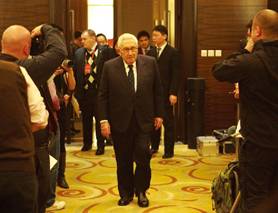
K: A good question. We learned through history that we are economically interdependent, in areas such as technology transfer, and many otheres. This relationship will continue and be continuously adjusted in the new era.
BQ: Hilary Clinton will be the new Secretary of State, what should she pay attention to, in your opinion?
K: We have known each other for many years and I know she is a strong and intelligent Secretary of State. I strongly believe she will actively advance Sino-US relations. Every Secretary of State has his/her own strategy and I wish her all the best.
BQ: You mentioned in the very beginning that the Chinese and American media could not find common topics and could only find some international topics such as poverty?
K: No. I mentioned others. In general, ministers of foreign affairs may discuss many daily issues including many practical problems during meetings. When I met with Premier Zhou Enlai, we barely had topics for discussion; the only topic was the Sino-US relationship in the long run. When Nixon, Mao Zedong, Zhou Enlai, and I had a meeting, we discussed urgent diplomatic issues. I hope in the future presidential meetings with both nations can be institutionalized so that long-term strategic issues can be discussed.
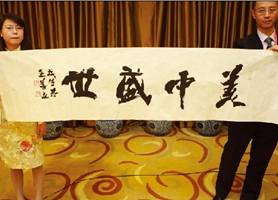
BQ: If you took the position of Secretary of State again, what would be your first priority?
K: Nuclear proliferation, energy and international financial system… Leaders of each country are facing great challenges but also good opportunities. In one aspect, many problems exist, but in the past days we have also seen the existence of friendship; secondly, we also learned about the risk of economic crisis with the long-term co-existence of opportunities. I fully expect the coming years to see more development of these opportunities.
Related links
Obama vows to boost Sino-US relations, says Carter
Sino-US ties at new point: ambassador
NYSE marks 30th anniversary of US-China ties
Warning:The use of any news and articles published on eChinacities.com without written permission from eChinacities.com constitutes copyright infringement, and legal action can be taken.
All comments are subject to moderation by eChinacities.com staff. Because we wish to encourage healthy and productive dialogue we ask that all comments remain polite, free of profanity or name calling, and relevant to the original post and subsequent discussion. Comments will not be deleted because of the viewpoints they express, only if the mode of expression itself is inappropriate.
Please login to add a comment. Click here to login immediately.